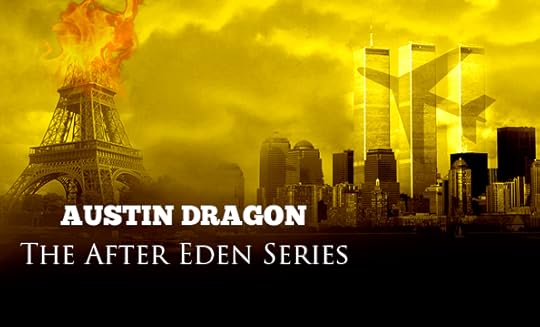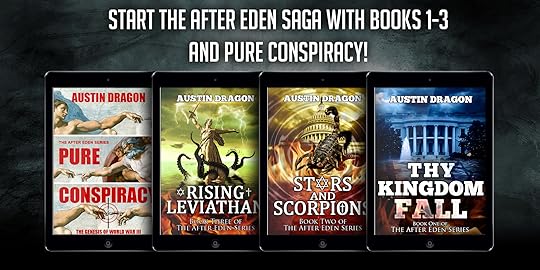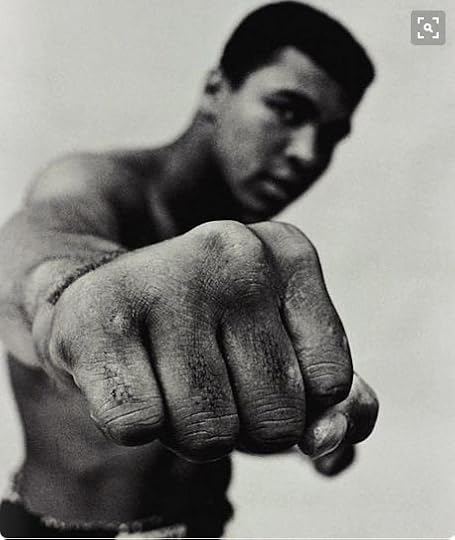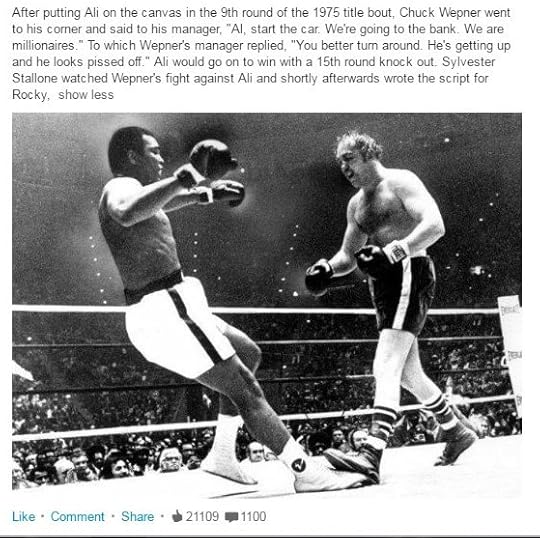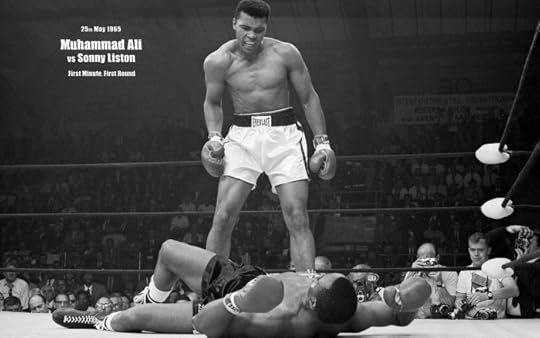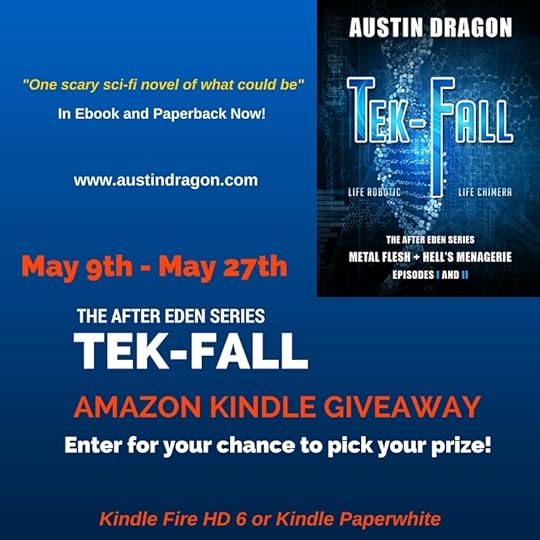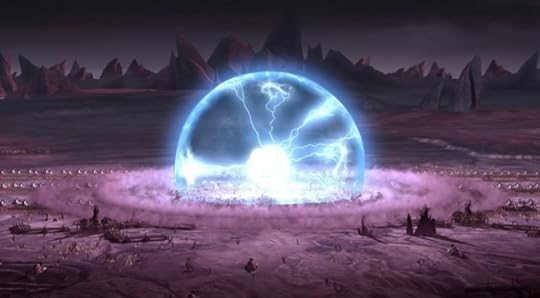Austin Dragon's Blog, page 11
August 5, 2016
A Writer’s Retreat in August 2016
When I lived in Paris for year as a young 20-something I was introduced to a perennial European custom – the “Grandes Vacances.” During the month of August, it seemed like everybody vacated the city, except for the tourists.
Well, I’m doing something similar this August.
The first half of 2016, I have spent more time on the business of my writing life than actual writing. But I don’t have one book whirling around inside my head demanding to be set free; I have three of them. (Actually, I have a lot) So, I’m off on my own writers’ retreat to return after Labor Day in September.
I’ll be around answering any of your emails as normal and I’m going to do a series of “Ask the Reader” articles for my VIP Readers’ Club to see which of my new upcoming series you think I should do first (Yes, sign up to become a member if you aren’t one yet and get three free books just because I like the cut of your jib).
Also, for those of you “after me”, yes, one of those new books for this year will be Liquid Cool #2 in my crazy cyberpunk detective series. For my After Eden fans, the other will be the next installment in the epic sci-fi, international series.
So until September 6th, I’m going to do what Cruz, the detective, did in Liquid Cool #1. I’m locking myself away in “the box” to get a ton of writing done. See you then with Name Reveals, Cover Reveals, new books, and new surprises!
(The word cloud above will also give you some clues as to what’s coming next year)
Off to do a ton! of writing,
Austin
The post A Writer’s Retreat in August 2016 appeared first on Official Website of Author Austin Dragon.
August 2, 2016
The Winner! (Liquid Cool UK Invasion Kindle Giveaway)
Hope you had a great weekend!
Well, we wrapped up our Liquid Cool UK Invasion Kindle Giveaway last Saturday. It was to celebrate the new release of the Liquid Cool Bonus Pack–the prequel, Liquid Cool Book 1, and a sneak peek of Liquid Cool Book 2; all in one.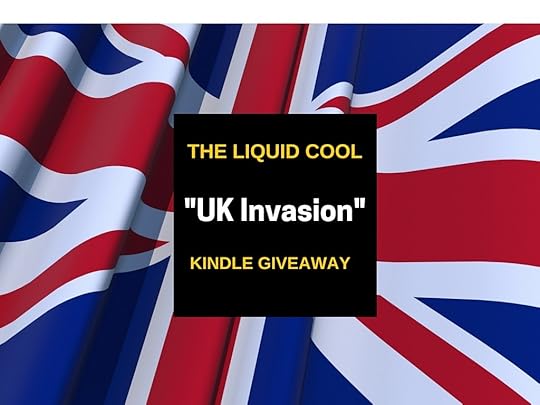
The Lucky Winner?
Congrats to Valerie S.! She picked her prize. Enjoy your brand new Kindle Fire HD 6, Valerie!
As always, thanks to all who participated!
More giveaways to come for 2016.
The post The Winner! (Liquid Cool UK Invasion Kindle Giveaway) appeared first on Official Website of Author Austin Dragon.
July 5, 2016
The Liquid Cool “UK Invasion” July 2016 Kindle Giveaway!
The Bonus Pack for my debut Liquid Cool–the cyberpunk detective thriller series is here! The prequel, first novel, and sneak peek of Liquid Cool, Book 2–all in one novel. So let the celebration begin.
What do we mean by “UK Invasion”? This promotion is being specifically promoted to the United Kingdom! Why shouldn’t the Brits, Scots, Welsh, and Irish have their own giveaway.
There are lot of popular Kindles out there, so rather than trying to figure out which one to give away, we’ll let YOU pick from the two most popular ones! The lucky winner will get to choose their prize–Amazon’s bestselling Kindle Fire HD 6 tablet or Kindle PaperWhite e-reader! (Nook and Kobo fans can also join in and pick the equivalent, such as the Glo HD tablet)
Our July 2016 Liquid Cool “UK Invasion” Kindle Giveaway begins Tuesday, July 5th and ends Saturday, July 30th at midnight.
Enter below for your chance to win!
Author Austin Dragon’s Liquid Cool “UK Invasion” July 2016 Kindle Giveaway!
For those Leaving Comments on this page for the Giveaway, the question is:
What is Your Favorite Sci-Fi and Detective Movies. If Liquid Cool is a genre blend of sci-fi and detective thriller, name both your favorite science fiction and detective movie. (For example: Blade Runner + The Maltese Falcon)
#Win #FREE #Amazon #Kindle #KindleFire #KindlePaperWhite #Kobo #Nook #Giveaway
The post The Liquid Cool “UK Invasion” July 2016 Kindle Giveaway! appeared first on Official Website of Author Austin Dragon.
June 22, 2016
Thy Kingdom Fall: Series Overview
The After Eden Series will be seven or eight main books, but it is also divided into two volumes. Thy Kingdom Fall (Book 1) begins the “Genesis of World War III” volume and this year’s release of Red Halo (Book 5) will end that volume. The next volume is the explosion of World War III.
The After Eden Series (Chronological Order)
Thy Kingdom Fall (After Eden Series, Book 1)
Stars and Scorpions (After Eden Series, Book 2)
Metal Flesh (After Eden Series: Tek-Fall, Episode I)
Hell’s Menagerie (After Eden Series: Tek-Fall, Episode II)
Rising Leviathan (After Eden Series, Book 3)
Pure Conspiracy (After Eden Select Novel)
Red Halo (After Eden Series, Book 4) Coming Soon!
The After Eden Series (Group Order)
Main After Eden Series
Thy Kingdom Fall (After Eden Series, Book 1)
Stars and Scorpions (After Eden Series, Book 2)
Rising Leviathan (After Eden Series, Book 3)
Red Halo (After Eden Series, Book 4) Coming Soon!
After Eden: Tek-Fall Companion Novels
Metal Flesh (After Eden Series: Tek-Fall, Episode I)
Hell’s Menagerie (After Eden Series: Tek-Fall, Episode II)
After Eden Select Novel
Pure Conspiracy (After Eden Select Novel)
But let’s go deeper in analyzing the series. To uses Marvel movie terms, we are in Phase I or Volume I:
Volume I: The Genesis of World War III
This is where we are introduced and immersed in this future world. We learn the players, politics, religions, technology, and conflicts.
Volume II: World War III
This is where the series changes styles. It’s starts with the Battle of Wolf 359 (See Dictionary Below) and WW III explodes between the three superpowers—America, the Caliphate, and CHINs. But as we see in Thy Kingdom Fall and evn in Book Three, Rising Leviathan, the conflict between the three was just a matter of time. We don’t need aliens from other planets coming to Earth to destroy everything. We can do so quite well, all by ourselves.
Net Dictionary
I added this to all the After Eden books to give the reader a quick immersion into this future world. However, in Thy Kingdom Fall we really don’t need it because we see and experience these terms at work.
Wolf 359: 1. A red dwarf star located in the Leo constellation, approximately 7.8 light-years from Earth, making it one of the stars nearest to our solar system. 2. A fictional space battle in the Star Trek Universe between the United Federation of Planets and the Borg Collective in the year 2367. 3. The opening battle of World War III in New York City on September 11, 2125. Over sixty percent of the United States of America Atlantic Oceanic Battle Fleet was destroyed by the Supreme Islamic Caliphate Battle Group on the first day.
Other terms:
Pagan: (universal or American usage) a non-believer of god or gods; one that doesn’t believe in religion, often negative to, hostile to, or hateful of religion.
Jew-Christian: (American usage [by non-religious people]) a religious person, other than Muslim.
Faither: (global usage [by religious people]) a religious person, other than Muslim.
Tek World: common slang for tek-cities, tek-metropolises, or general tek-society.
Resistance: (pre-World War III) [by non-religious people] government term for the network of Jew-Christian domestic “terrorists” in America. [by religious people] the civilian resistance force against the militant, anti-religious American government.
Continuum: (general usage) the parallel society created by and controlled exclusively by Faithers outside of Tek World. (formal usage) the formal alliance of the New Protestant Order, New Jewish Continuum, New Catholic Order, Mormon Order, the African Collective, Shogun, and the Magi.
Thy Kingdom Fall also laid out the style that’s used in the first four main novels.
Two parts with a main protagonist in each part; one male, one female; and each part focusing on a different religion. In Thy Kingdom Fall, the two Parts are “A Brave Tek World” with the main protagonist being the Pagan (atheist) Logan, a famous DC journalist. The unlikely main protagonist in Part II is the “Protestant Order” (Rise of the Resistance) is Kristiana, a Pennsylvania Amish girl.
Commentary about the main religion groups in The After Eden Series:
Jews and Christians – yes, there are actually civil wars within each group.
Other religions: Mormons, Amish, Mennonites, Goths, Sikhs, Hindus.
Islam – not a focus until Book 5, but in the background. The main conflict in the first two books in particular is religious vs. irreligious.
New Religions: Vampires, Vulcans, Jedi, etc. These are actually recognized religions now.
Atheists – Yes, atheism is technically a religion too (US Supreme Court ruled that secular humanism is a religion in…1961!) A bit more complicated but in The After Eden Series we see a big distinction between militant atheists and average atheists/agnostics.
Thy Kingdom Fall buy page is HERE.
The After Eden Series page is HERE.
The post Thy Kingdom Fall: Series Overview appeared first on Official Website of Author Austin Dragon.
June 15, 2016
‘The Greatest’ Muhammad Ali – RIP
Born: January 17, 1942, Died: June 3, 2016 at the age of 74.
I want to say just a few words about “The Greatest” also known as Muhammad Ali. It was last week that thousands of people paid their final respects to the boxing legend at his memorial service in Louisville, Kentucky.
I don’t watch boxing at all, but as a kid I loved it. Some years back I realized why I went from loving the sport back then to not being able to watch even ten seconds of it now—mainly, the absence of Muhammad Ali. My goodness, watch the documentary of the “Rumble in the Jungle,” the historic 1974 boxing event between the Ali and George Foreman –Foreman went from being the vicious brute George Foreman to the kindly, smiling George Foreman we know and love today after that fight. The entire world was watching “The Rumble”, including world leaders.
Some have brought up the politics around Ali at the time, but I dismiss all of that. Ali was a twenty year old “kid” who got sucked into the torrents of the time—the Vietnam War, the Black Power Movement, the Nation of Islam. It’s easy for us to say now, six decades later, that we’d be wiser about our associations and decisions if we him back then. But that’s just talk and in our hearts we know that’s silly for us to say. I was smart when I was twenty, but I was still a kid.
As a veteran, I have no issue with those who opposed the Vietnam War—none whatsoever. Some did it for principled reasons; others, not so much, but Ali took his lumps. He was banned from boxing, but fought it in the courts and prevailed.
(I do, however, have an issue with how our Vietnam Vets were shamefully treated by some segments of the public and especially, how those against the war were nowhere to be found and conveniently silent when the Communists took over Vietnam, after America pulled out, and killed millions of innocent people.)
Even today, some glamorize the Black Power Movement back then. The birth of the movement was understandable—there was a “little” something called legal racial segregation. However, the Black Panthers were pips and criminals and the Nation of Islam were, to use the late US Supreme Court Justice Thurgood Marshall’s words, “a bunch of thugs.” The Nation of Islam controlled the life of a young Muhammad Ali and stole his fortune, which is sadly why he was fighting longer than he should have in the career. I loved watching him box as a kid, but not at the expense of the sport and the constant battering possibly contributing him getting the neurodegenerative disorder, Parkinson’s. That Black Power Movement hated people, but Ali was not a hater. He loved life, people and it showed. He left the Nation of Islam, became a Sunni Muslim and went about his life.
Watch any of those documentaries of Ali in his prime and his “performances” in the many interviews and you can’t help but to smile. He was one of those people that you liked to be around and could entertain you for hours, and he didn’t even need to get in the boxing ring to do so.
As I look at my the picture of his famous photo of his victory over Sonny Lister in 1963, I say, yes, I’ll miss “The Greatest” for the joy he brought to the world and skill he brought to that long ago Golden Age of Boxing. Forget all the politics that a young Cassius Clay got caught up in. He came through it all as a genuinely good and decent person. There are not too many public people that we can think of fondly after more than 50 years on the public stage.
#MuhammedAli #RIPMuhammedAli
The post ‘The Greatest’ Muhammad Ali – RIP appeared first on Official Website of Author Austin Dragon.
June 8, 2016
Thy Kingdom Fall: How Bad is Bad?
When we think of world wars, this is the image we think of.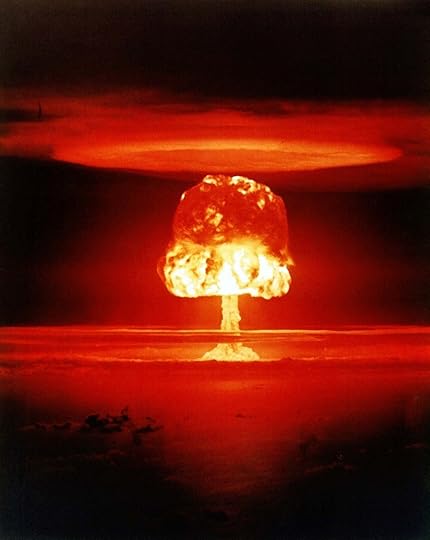
But the coming war in the After Eden series will be “worse”–“A-bombs are so 20th century.” “We’re the people of the future and we can be more “creative” in our global wars.” And that’s exactly what they do.
America will transform from majority religious to majority irreligious
America is a Christian nation, meaning the majority of the population identifies as being Christian. However, having been a Christian for over four decades and an active observer, I’d assert we are already there. An author already coined the phrase: “Christian atheist.” The two areas I’m most interested in is doctrinal knowledge (why do we believe what we believe, what is the history of faith) and self-protection. You can’t defend who you are as a people if you don’t know who you are and where you came from—your enemies surely do and quoting a verse or two doesn’t cut it.
Some might say that America becoming less religious is better. I would agree that in the Muslim world that becoming “less” religious is best (and the only way the religion can survive, in my opinion—remember has never had its Reformation like Christianity and Judaism), but America is different. Do you have to be religious to be good? No, but in the macro sense for America, the answer is yes. An irreligious America is not the same as a religious one. The former is a completely different nation that the latter. If America, simply becomes “one of the boys on the global stage” then not only does America get worse, so does the world. The world would let Israel be wiped off the face of the map. The world allowed almost one million Rwandans to be slaughtered by machete-wielding animals in its three month genocide (that’s a faster kill rate than even the Nazis) and did nothing. The world says nothing as global sex slavery endures—women and children, gays and those of the “wrong” religion are exterminated in the Muslim world, one atrocity after another. It’s America that leads any opposition, if there is any to have. If America becomes the “world”, then that means the world will do what it always does in the face of evil—nothing.
In Thy Kingdom Fall, we see this transformation accelerate through politics. Some group must be found to hate to rally the people against—for good of the nation. That group targeted is religious people—the only people who could potentially fight back and increasingly totalitarian nation through technological advance.
Western Europe will transform from secular to Islamic
Regardless of whether you’re religious or not, the simple fact is secular people don’t have children and religious people do—unless those religious become more and more secular in their behavior and world view. Secular Europe has had a negative population growth for decades, meaning they have not had enough children to replace the population. Due to their socialistic society and massive welfare state they did not have enough workers with the shrinking and ageing of that workforce. Solution: import workers from other countries—those workers were large numbers of Muslims, who worked but a disturbing number were not interested in assimilating. Please do not recite the politically correct, knee-jerk, university propaganda definition of “assimilation.” My definition is simple: you’re a citizen or you were born in that country, you are the country and should be proud. You’re not an outsider. Sadly, Western Europe is going to reap a very bad future for its societal politics and policies with a radical population shift. For Western Europe, there is one group that is having lots of children—Muslims populations. It is simple math: Islam will take over Western Europe within 25 to 50 years.
In Thy Kingdom Fall, we see this transformation of Europe take place through the eyes of an analyst who becomes the American president—and he’s not a good guy, but he sure is ruthless in protecting America from Islam. Too bad he views the pacifist Amish as the same as an Islamic terrorist.
Technology will allow us to do things that we shouldn’t be doing
There have been plenty of science fiction books and movies about it. The scary fact is that is no longer fiction. From artificial intelligence to cloning to genetic engineering, it is all here now. I wish I could say that all this god-like power unequivocally made humans better, but I can’t and 80 years in the future…Thy Kingdom Fall says our brave new world will become quite a scary place for all involved.
One of my reviews of an After Eden novel asked is “Austin Dragon the next Nostradamus”. Flattering, of course, but even as a child, I have had the ability to see trends far beyond my years. Thy Kingdom Fall is serious sci-fi and after the next book in the series, Red Halo, we get to the event that’s been teased from the beginning—World War III. It’s a thriller serious, but it is all very grim.
Thy Kingdom Fall buy page is HERE.
The After Eden Series page is HERE.
Next Week: Thy Kingdom Fall / Series Analyzed
The post Thy Kingdom Fall: How Bad is Bad? appeared first on Official Website of Author Austin Dragon.
June 1, 2016
Thy Kingdom Fall and Prophecy
April 4, 2013 is when I became a published author.
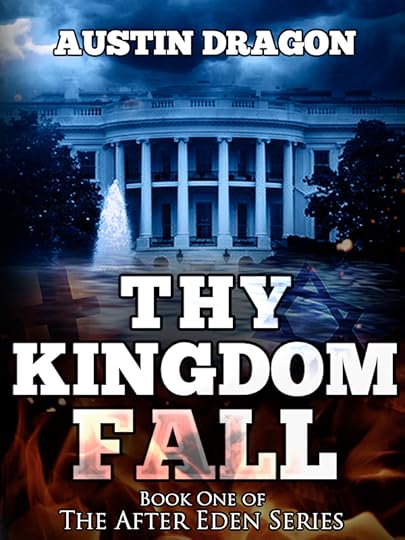 I hadn’t written a word of fiction in over 15 years and then I released Thy Kingdom Fall, Book 1 of my epic, international, science fiction After Eden series (subtitled: The Genesis of World War III). Four months later, I released Stars and Scorpions, Book 2 of the series. These are not short books, but I was able to do so because I actually wrote Book 2 before Book 1. (I’ll explain why and how that happened next month.)
I hadn’t written a word of fiction in over 15 years and then I released Thy Kingdom Fall, Book 1 of my epic, international, science fiction After Eden series (subtitled: The Genesis of World War III). Four months later, I released Stars and Scorpions, Book 2 of the series. These are not short books, but I was able to do so because I actually wrote Book 2 before Book 1. (I’ll explain why and how that happened next month.)
The After Eden Series is very political, religious, and provocative. It’s not political in the sense of Democrat or Republican, but it is a thriller starting out with a murder in Washington DC of a political king-maker. It’s not political in the sense of liberal or conservative either because it’s 80 years in the future and the “culture wars” are over—any form of marriage is legal, prostitution is legal, all drugs are legal, the US Constitution has been replaced by the Rule of Law, there are 53 states, presidential term limits have been abolished, and America is majority secular. Ironically, abortion is illegal, but not for why you think.
I wrote the book in 2012 predicting a number of things that were not true at the time: expansion in the use of domestic drones, redefining marriage, redefining gender, and the Baron Trump Hotel. For the last item, that prediction will take on a whole other level, if what happens in November 2016, happens.
The series is very religious and has done well in the Christian Futuristic Fiction category, but it’s not quite that at all—though I am a Christian. In other words, the goal is not to proselytize. The underdogs in this future world are the religious—religious Jews, Christians (Protestant and Catholic), Mormons, Amish, Mennonites, etc. who no longer live in the major tek-cities. One would describe this future as utopian in the tek-cities; dystopian for life outside of it—called the Outlands, and beyond is Trog-land, or where religious people live. But everyone is living in exactly the communities and in the society they wish to live in.
The series is provocative in not only showing this radically different (and plausible future) world, but for what comes after the midpoint in the series in Book 4, which I’m working on now. That is the outbreak of World War III with the attack on the United States by the Supreme Islamic Caliphate. In fact, that’s how Thy Kingdom Fall opens with its first chapter, this “flash-forward” to September 11, 2125. It is through different timelines that the book takes us through the story. It is also through various flashbacks that we learn about pivotal characters in the series (and the future war).
The After Eden Series is also international. Thy Kingdom Fall takes place in America, but we are introduced to the global political landscape every much as we are immersed in the domestic political landscape. Domestically, it isn’t just the divide between the anti-religious majority and a religious minority, but those who live in the cities, and those who don’t; those who are part of the Grid, and those who are not. Internationally, we see the world is divided into three superpowers—America, the Supreme Islamic Caliphate (born from the “assimilation” of Western Europe), and the Chinese-Indian Alliance.
Thy Kingdom Fall is all this and a dramatic thriller too. We meet a lot of people—pacifist Amish, violent Vampires (not what you think), Jewish and Christian freedom fighters, Outland Nihilist Goths, powerful governors and presidents, and possibly more powerful hackers and “tek-lords”.
What is the message of the After Eden Series? From the foreward…
“After Eden, Thy Kingdom Fall. All Kingdoms Fall, New Kingdoms Rise.”
World War III. It was inevitably going to be one of religion, this great, grim, evil war of humans, machines, and other things in the shadows that have never existed before. Unfortunately, neither the cause nor the outcome was within our perception, though the former should have been. No one could ever have imagined that it would not just be the third of the world wars, as that is unremarkable, but the explosion of the first global war of the Technological Age, the Tek Age—a hell we had never seen before.
The message is very simple: It could have all been avoided.
Thy Kingdom Fall buy page is HERE.
The After Eden Series page is HERE.
Next Week: Thy Kingdom Fall – How bad is bad?
The post Thy Kingdom Fall and Prophecy appeared first on Official Website of Author Austin Dragon.
May 8, 2016
The Tek-Fall May 2016 Kindle Giveaway!
This month we celebrate the paperback release of The After Eden Series: Tek-Fall–the international, sci-fi thriller that explores the theme from the classic Gothic horror, Frankenstein, but this time we’re talking about “living” robots and man-made creatures. How are we celebrating? With a Kindle Giveaway!
One lucky winner gets to pick their prize: a Kindle Fire HD 6 or Kindle Paperwhite–Amazon’s most popular e-readers. (Kobo fans can get Kobo Glo HD tablet equivalent)
Our May 2016 Kindle Giveaway begins Monday , May 9th and ends Friday, May 27th!
Enter below for your chance to win!
Author Austin Dragon’s “Tek-Fall” May 2016 Kindle Giveaway
For those Leaving Comments on this page for the Giveaway, the question is:
If you win, what’s the first ebook you’re going to download (Name and genre) and why?
#Win #FREE #Amazon #Kindle #KindleFire #KindlePaperWhite #Giveaway
The post The Tek-Fall May 2016 Kindle Giveaway! appeared first on Official Website of Author Austin Dragon.
May 3, 2016
But Should We? (When Man Plays “God”)
Do you know what’s considered the first science fiction novel ever? Frankenstein by Mary Shelley in 1818. The full title is Frankenstein or The Modern Prometheus. So in the Gothic novel classic the “mad scientist” (Victor Frankenstein) created his “new” human from corpses and brought it to life with the power of lightning. But let’s say the scientist isn’t “mad” and it’s not corpses? This is the 21st century after all. We have DNA mapping, genetic manipulation, and cellular cloning, which are no longer science fantasy but scientific fact.
The Ethics Board solicits you for your layman’s opinion. Should we? We’re just “creating” a cute cat with peacock feathers. What’s the harm? Yes, we’ll want to do other things later, but let’s start here. Should we? What’s your answer?
My After Eden Series is an international science fiction thriller series leading to World War Three. But this is the future—a century from now. A global war today would be beyond comprehension, but imagine 100 years from now.
In the second novel in the series, Star and Scorpions, I introduced this notion of man-made creatures. I won’t spoil the plot for those who have not read it, but the After-Eden: Tek-Fall miniseries goes further. Episode I deals with “playing God” with mechanical constructs—robots and androids, and Episode II deals with man-made creatures and clones. Self-replicating and “sentient” in the former, reproductive abilities in the latter–both explicitly for war purposes. How frightening indeed!
Here are the poems from my Tek-Fall books:
The Metal Flesh Poem
God creates Man.
Man rejects God.
Man creates Machines.
Machines become God.
Man accepts new God.
Machines kill Man.
Machines self-terminate.
God resets the universe.
A Hell’s Menagerie Poem
God creates Animals.
God creates Man.
God tells Man to take care of the Animals.
Man exterminates the Animals.
Man creates New-Animals.
New-Animals kill Man.
New-Animals kill each other.
God resets the universe.
As if normal weapons of mass destruction would not be enough. We see from this miniseries that this coming global war has far more profound dimensions than just world superpowers and religions versus anti-religious factions.
For a story this bleak you need someone to shepherd you through who is far from morose. What we get is a character by the name of Sprocket. It’s through his eyes we maneuver through this conspiracy all over the world, both in Tek-World and Faith World. Yes, he gets a laugh at seeing Amish and Mennonites on hovercraft, too.
But back to our serious question for you, or let’s make it two questions:
Should we? Would you make a cat (or dog) with peacock feathers?
And where should society draw the line?
Here’s a quote for you. “The scientists of today think deeply instead of clearly. One must be sane to think clearly, but one can think deeply and be quite insane” — Nikola Tesla, American inventor, scientist and futurist.
Comment with your answers to the questions below.
The After Eden Series: Tek-Fall (Complete Mini-Series) is available in ebook and paperback.
The post But Should We? (When Man Plays “God”) appeared first on Official Website of Author Austin Dragon.
April 27, 2016
Part II: Will Technology Just Kill Us All?
The Disgruntled Worlds of Cyberpunk, Biopunk, General Dystopia, Apocalyptic, and Post-Apocalyptic Sci-Fi.
Cyberpunk, Biopunk, General Dystopia, Apocalyptic, and Post-Apocalyptic Sci-Fi. And there’s a lot more–Steampunk, Dieselpunk, Decopunk, and Nanopunk. What the heck? What are all these sub-genres of Science Fiction?
Here are the definitions of the “main” sub-genres: [Courtesy of Moira Allen at Writing-World.com]
Apocalyptic, holocaust, and post-apocalyptic science fiction focus on the end of the world, or the world just after “the end.” In Niven and Pournelle’s Lucifer’s Hammer, society is wiped out by a comet and must rebuild; in Nevil Shute’s On the Beach, humanity is destroyed by a nuclear holocaust; in Stephen King’s The Stand, humanity must cope with the aftermath of a devastating plague.
Cyberpunk is set in a high-tech, often bleak, mechanistic and futuristic universe of computers, hackers, and computer/human hybrids. The subgenre was pioneered by Bruce Sterling and William Gibson, who coined the term “cyberspace” in Neuromancer. Humans may have built-in computer jacks or software (“wetware”), and spend considerable time “living” in a virtual environment, as in The Matrix.
First Contact explores the initial meeting between humans and aliens, ranging from horrific tales of invasions to stories of benign visitors bearing the secrets of advanced technologies and world peace (or irony, as in The Twilight Zone episode “To Serve Man” — the one that ended, “It’s a cookbook!”). The meeting may occur on Earth, in space, or on another planet. H.G. Wells’ War of the Worlds helped define the “alien invasion” variant of this subgenre.
Hard Science Fiction is driven more by ideas than characterization. Plausible science and technology are central to the plot. If your story is set on a lunar colony, for example, issues of technology may be of greater concern than a character’s personal life. To write effectively in this subgenre, an author must generally have a good grasp of the scientific principles involved. Much classic science fiction, including the earlier works of Asimov and Heinlein, fall into this category.
Military Science Fiction looks at combat in future locations (space, another planet), against a range of opponents (modified humans, aliens, machines), with futuristic, high-tech weaponry (including genetically modified soldiers). While some military science fiction asks “how fast can we blast the bugs?” (Robert Heinlein’s Starship Troopers), many authors use this subgenre to address anti-war themes. David Drake’s Hammer’s Slammers series explores both the heroism and the carnage of warfare.
http://www.pinterest.com/austindragonScience fantasy/future fantasy, rare now but popular in the 1930’s and 1940’s, alters, breaks, or ignores known laws or scientific theories for the sake of the story. Edgar Rice Burroughs’ Barsoom novels (set on Mars) are a good example.
Slipstream (or Speculative Fiction) deals with “mainstream” themes but contains a speculative element. Margaret Atwood’s The Handmaid’s Tale is set in a speculative future, for example, but is marketed as a mainstream novel.
Space opera, like Western “horse operas,” often involves good guys “shooting it up” with bad guys (who may be aliens, robots, or other humans) in the depths of space or on a distant planet. Space operas (of which Star Wars is a classic example) don’t worry about scientific implausibilities; technical explanations tend to be vague (“You see, Bob, if you fold space just so…”).
Time Travel was popularized by H.G. Wells with The Time Machine (1888), though Edward Page Mitchell wrote “The Clock that Went Backwards” seven years before that. Characters travel to the past or future, or are visited by travelers from either end of the spectrum. Topics range from “Let’s go see what the Pleistocene looked like,” to issues of paradox (what if you traveled to the past and killed your own grandfather?) and “tampering” (could stepping on a butterfly in the Paleolithic profoundly alter the entire future?). A variant of this subgenre is the “alternate universes” theme, in which each change in the timestream spins off a new universe.
Would you believe that there are even sub-genres of the cyberpunk sub-genre and derivative sub-genres? [From Wikipedia – Cyberpunk Derivatives]
Biopunk emerged during the 1990s and focuses on the near-future unintended consequences of the biotechnology revolution following the discovery of recombinant DNA. Biopunk fiction typically describes the struggles of individuals or groups, often the product of human experimentation, against a backdrop of totalitarian governments or megacorporations which misuse biotechnologies as means of social control or profiteering. Unlike cyberpunk, it builds not on information technology but on biorobotics and synthetic biology. As in postcyberpunk however, individuals are usually modified and enhanced not with cyberware, but by genetic manipulation of their chromosomes.
Nanopunk refers to an emerging subgenre of speculative science fiction still very much in its infancy in comparison to other genres like that of cyberpunk. The genre is similar to biopunk, but describes a world in which the use of biotechnology is limited or prohibited, and only nanites and nanotechnology is in wide use (while in biopunk bio- and nanotechnologies often coexist). Currently the genre is more concerned with the artistic and physiological impact of nanotechnology, than of aspects of the technology itself.
Postcyberpunk. As new writers and artists began to experiment with cyberpunk ideas, new varieties of fiction emerged, sometimes addressing the criticisms leveled at the original cyberpunk stories. Lawrence Person wrote in an essay he posted to the Internet forum Slashdot in 1998: “Many writers who grew up reading in the 1980s are just now starting to have their stories and novels published. To them cyberpunk was not a revolution or alien philosophy invading science fiction, but rather just another flavor of science fiction. Like the writers of the 1970s and 80s who assimilated the New Wave’s classics and stylistic techniques without necessarily knowing or even caring about the manifestos and ideologies that birthed them, today’s new writers might very well have read Neuromancer back to back with Asimov’s Foundation, John Brunner’s Stand on Zanzibar, and Larry Niven’s Ringworld and seen not discontinuities but a continuum.”
Person’s essay advocates using the term postcyberpunk to label the new works such writers produce. In this view, typical postcyberpunk stories continue the focus on social implications within a post-third industrial-era society, such as a ubiquitous datasphere of computerized information and cybernetic augmentation of the human body, but not necessarily with the assumption of dystopia. It is rather characteristic for postcyberpunk to portray an utopia or to blend elements of both extremes into a more mature (to cyberpunk) societal vision.
Steampunk. The word “steampunk” was invented in 1987 as a jocular reference to some of the novels of Tim Powers, James P. Blaylock, and K. W. Jeter. When Gibson and Sterling entered the subgenre with their 1990 collaborative novel The Difference Engine the term was being used earnestly as well. Alan Moore’s and Kevin O’Neill’s 1999 The League of Extraordinary Gentlemen historical fantasy comic book series (and the subsequent 2003 film adaption) popularized the steampunk genre and helped propel it into mainstream fiction.
The most immediate form of steampunk subculture is the community of fans surrounding the genre. Others move beyond this, attempting to adopt a “steampunk” aesthetic through fashion, home decor and even music. This movement may also be (perhaps more accurately) described as “Neo-Victorianism”, which is the amalgamation of Victorian aesthetic principles with modern sensibilities and technologies.
Dieselpunk is a genre and art style based on the aesthetics popular between World War I and the end of World War II. The style combines the artistic and genre influences of the period (including pulp magazines, serial films, film noir, art deco, and wartime pin-ups) with retro-futuristic technology and postmodern sensibilities. First coined in 2001 as a marketing term by game designer Lewis Pollak to describe his role-playing game Children of the Sun, dieselpunk has grown to describe a distinct style of visual art, music, motion pictures, fiction, and engineering. Examples include the movies Iron Sky, Rocketeer, K-20: Legend of the Mask, Sky Captain and the World of Tomorrow and Dark City, and the games Crimson Skies, Greed Corp, Gatling Gears, BioShock, The Legend of Korra and Skullgirls.
So many types of science fiction, and most of it dystopian in some way. However, the best way to think of science fiction is that it is attempting to tackle big themes using the future (or possible ones) as its canvas.
What are some of the big themes being tackled in Liquid Cool? What’s next in Liquid Cool?
The bigger technology becomes, the more vulnerable it becomes.
No matter how much good technology does, its potential for evil will always be more.
Technology: where the creator becomes the servant…or slave.
I really do like cyberpunk. In fact, even before I began writing Liquid Cool, the cyberpunk in me was seeping into my first published series, After Eden, with my Tek-Fall companion novels. The first episode was cyberpunk and robots; the second was cyberpunk and biopunk wrapped into one. More on my Tek-Fall Duology, another time.
How do I answer my own question? Will our own technology kill us all? Maybe. But I don’t think the culprit will be technology, rather human evil, or human apathy.
Get Your Free Copy of the Liquid Cool Prequel, These Mean Streets, Darkly Here Today.
Get Your Copy of the debut novel, Liquid Cool Here Today.
The post Part II: Will Technology Just Kill Us All? appeared first on Official Website of Author Austin Dragon.



